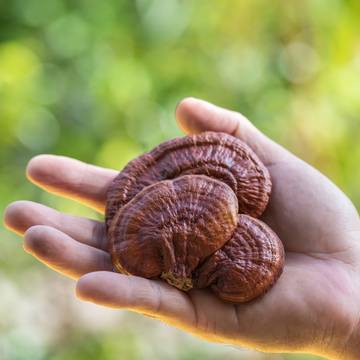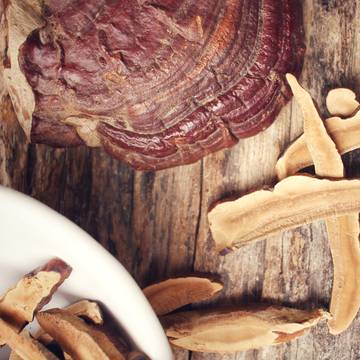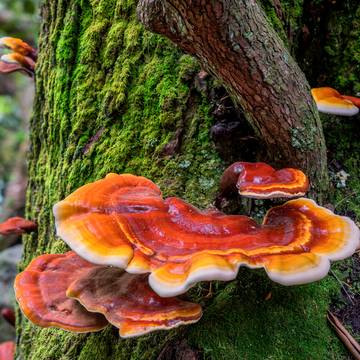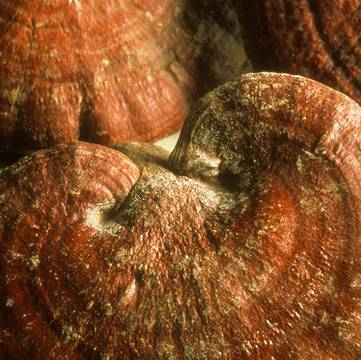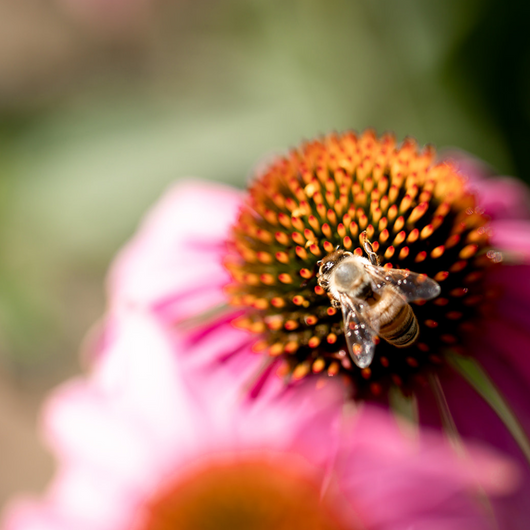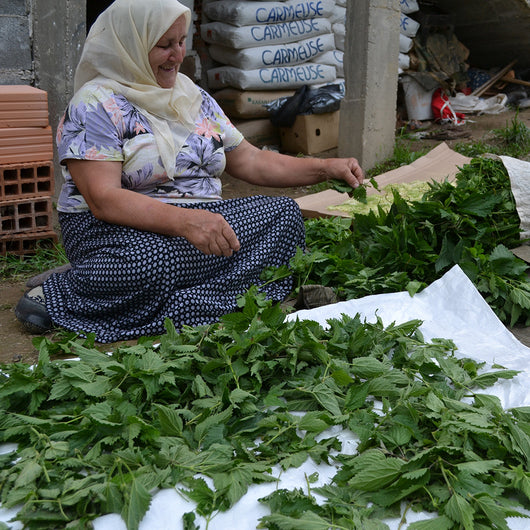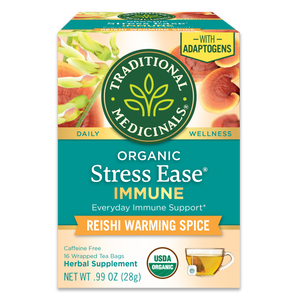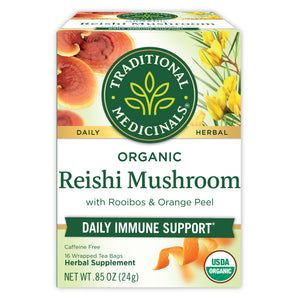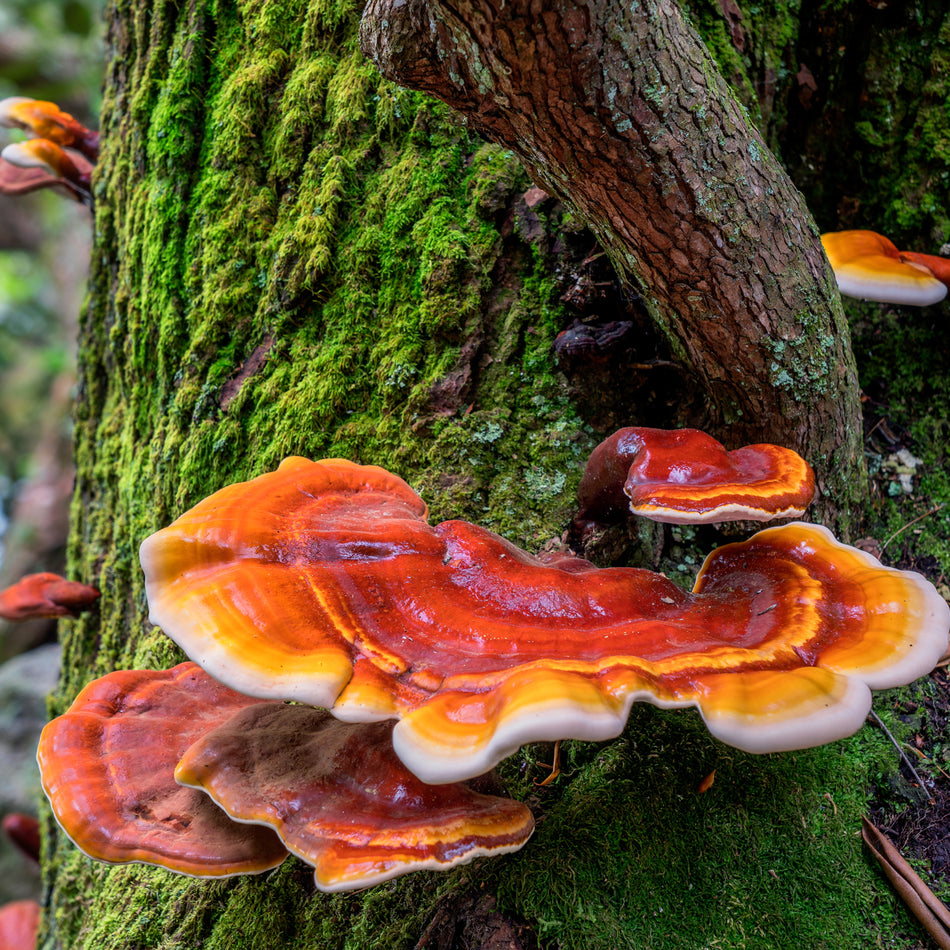
Reishi
Ganoderma lucidumRecognized for its ability to support a healthy immune system and help the body adapt to stress, it’s no wonder reishi is commonly known as “The Mushroom of Immortality.”*
Unearth the divine benefits behind, “The Mushroom of Immortality.”
What are the Benefits of Reishi?
Reishi mushroom (Ganoderma lucidum) has been exalted in spiritual ceremonies, infused into foods, and respected as herbal medicine across the globe for its adaptogenic effects and immune system support.* While its intricate root system, known as mycelium, supports our ecosystem through decomposition and nutrient exchanges with its neighboring plant life, its fruiting body is what’s most commonly used as herbal medicine.
Known in Asia for centuries, reishi is gaining popularity in the West for its ability to support the immune system and help keep the body in balance.* While reishi consists of an array of constituents and phytochemicals, the three most physiologically active constituents seem to be polysaccharides, peptidoglycans, and triterpenes. Presently, a good deal of research on reishi confirms its therapeutic potential due to high concentrations of polysaccharide compounds called beta-glucans, which contributes to its ability to support immune function.*
Because of reishi’s mechanism for gently bringing the body back into balance, it is traditionally prescribed to be used consistently and over time. A daily tea, dose of tea or infused broth are great ways to absorb its benefits while reminding us to center ourselves, breathe, and take things one step at a time.
Folklore & Historical Use of Reishi
Known as lingzhi in Chinese (literally translated as “Mushroom of Immortality”) reishi’s wellness benefits have been touted for 4,000 years. Representations of the mushroom began to appear in Taoist art in the 1400s, symbolizing luck and good health, and it appeared in the first Chinese pharmacopeia during the Ming Dynasty. Before traditional Chinese practitioners began to cultivate it, reishi was so expensive that only members of the noble classes could afford it, adding to its reputation as the “divine mushroom.” According to Taoist legend, the Isles of the Immortals held secret groves where the sacred mushroom grew lushly.
Practitioners of Traditional Chinese Medicine (TCM) have historically prescribed reishi to balance Qi (vital energy), bringing balance to the mind, body, and conscience. This seems to coincide with Western Herbalism’s classification of reishi as an adaptogen, a category of roots, leaves, berries, and fungi that bolster the body’s ability to handle stress under challenging circumstances.*
Botanical Description & Habitat
Native to tropical and temperate climates of Asia, North America, and Europe, Ganoderma lucidum, can be found growing upon the dead and fallen logs of deciduous trees. While it occurs in a variety of colors, from pale beige to shiny black, red reishi is most prized in many cultures for its medicinal properties.
As any avid mushroom hunter may attest, spotting the glossy veneer and hard kidney-like shape growing wildly is quite the treat; in regions where the mushroom is found, only two or three mature trees out of 10,000 will host reishi on their trunks.
When To Use Reishi
Drink multiple cups per day when immune support is needed.
Prepare for fall and winter with a daily dose of tea.
Consume regularly to bolster stamina and stress response.
The Business of Sustainable Plants
Our business is rooted in plants, and for us, it’s a business imperative that we care for the ecosystems where these plants live and thrive. We believe that everything is interconnected, which means supporting ecosystems and the farmers and collectors who harvest and gather our herbs. Finding opportunities to reduce or eliminate emissions at the source, we support organic and regenerative farming practices as well as voluntary certifications like Organic and FairWild. These ensure the absence of pesticides, herbicides, as well as the ongoing sustainability of wild collection, and the health and livelihoods of the collectors who forage. Josef Brinckmann, Traditional Medicinals’ Research Fellow, Medicinal Plants and Botanical Supply, asserts, “Everyone has a role to play in preserving biological diversity. One way of doing that is by equitably supporting the local people to serve as stewards of the land.”
It Starts with Organic
We choose to source organic because we believe in the positive impacts it has on environmental sustainability, biodiversity, and overall ecosystem health. Organic helps us increase transparency while prioritizing consumer well-being and farmer success, which is key to producing the high-quality herbs we source. In 2021, we procured 2.73 million pounds of certified organic herbs, over 99.7% of our total botanical herbs purchased. Volumes were down slightly from FY20 due to timing of inventories received.
The impact from organic farming creates a vital ecosystem through improved soil health, water quality, pollinator habitats, and biodiversity. Organic farms also have increased carbon sequestration potential through long-term carbon storage in the soil, helping to mitigate climate change.
One of the benefits of organic that we most value is farmer health. We care deeply about the people who produce our herbs, ensuring that they are not exposed to synthetic chemicals found in conventional agriculture.
Fair Trade
We believe that everyone deserves a fair wage for hard work. That’s one of the reasons why we’re committed to fair trade. Traditional Medicinals® is a registered Fair Trade “brand holder”, “licensee” and “manufacturer,” and our products are certified by Fair Trade USA, an independent third-party certifier. We were an early adopter of Fair Trade, having launched our first fair trade tea product in 1998, just one year after Fairtrade International (FLO) was established. We continue to work closely with our network of producers to help them to implement fair trade standards and get certified.
Reishi Mushroom with Rooibos & Orange Peel Tea
Additional Information
Legal Disclaimer:
The information and other content in this article is designed to provide a general overview of the botany, cultural history, and traditional uses of this herb. It is not intended and should not be construed as health advice. Every person is unique and you should consult with your health care provider before using any herbal product or supplement.

